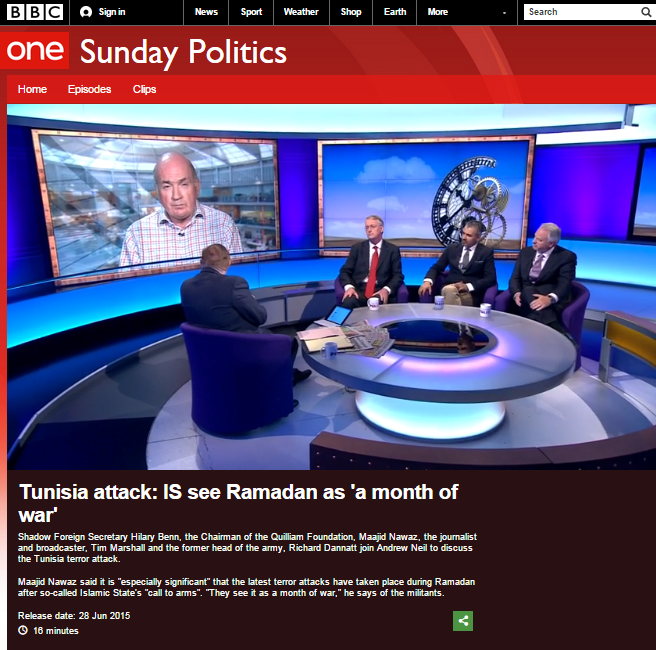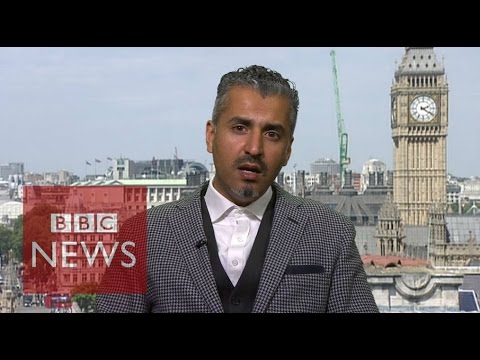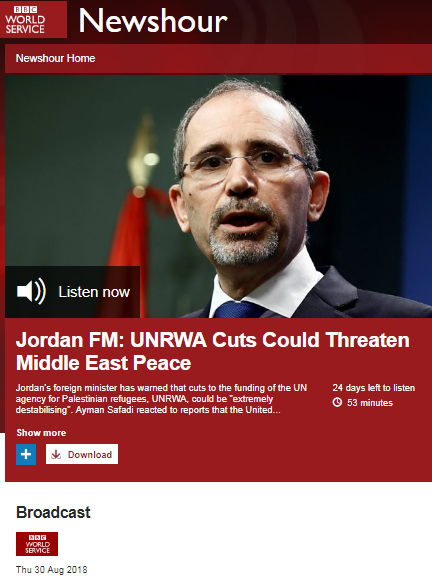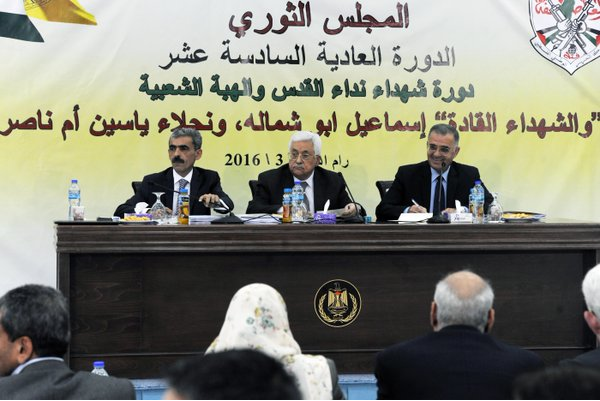The BBC has quite understandably devoted considerable air-time and column space to coverage of the June 26th terror attacks in Tunisia, France and Kuwait and some of that content (see for example here on BBC television news and here on the BBC News website) has addressed the fact that the attacks took place during Ramadan.
One particularly interesting discussion on that topic and others took place in the June 28th edition of “Sunday Politics” on BBC One – presented by Andrew Neil – with the sensible contributions from Maajid Nawaz and Tim Marshall being especially refreshing. As Nawaz pointed out:
“Jihadists in particular don’t see this as a month of prayer. They don’t see this as a month of merely spiritual replenishment. They see it as a month of war or a month of jihad.”
He later added:
“Yes, we are in a war but actually the target in this war – if we see it as just ISIS we’re incredibly short-sighted and prior to that we saw it as just Bin Laden who the international community killed and yet we had something far worse than Bin Laden emerge because we are fundamentally unable – due to reasons of political correctness or fear of being accused of being racist – we are unable to identify what the problem is here. […] President Obama – who is meant to be leading on this front – has not up until now named this ideology: it’s called the Islamist ideology. “
Of course in order to be able to name the ideology, people first need to be aware of what is happening and whilst Israelis are among those who have seen a sharp uptick in the already high number of terror attacks since Ramadan commenced, most of the BBC’s worldwide audience remains unaware of that fact.
On June 19th a fatal terror attack took place near Dolev with Hamas later claiming responsibility. BBC English language services did not report the incident but it was covered in Arabic.
On June 21st a Border Police officer was seriously injured in a stabbing attack in Jerusalem and another man was injured when a bus was firebombed later the same day. The BBC did not report either of those incidents.
On June 23rd a missile fired from the Gaza Strip exploded near Kibbutz Yad Mordechai. That attack was not reported by the BBC’s English language services but the Israeli response to it did get coverage in Arabic.
On June 26th a Palestinian gunman opened fire on soldiers at Beka’ot checkpoint in the Jordan Rift Valley. There were no BBC English language reports on that incident but it was mentioned briefly in a later report in Arabic.
On June 27th an ambulance traveling near Beit El was attacked with live gunfire. There was no BBC coverage of that attack.
On the morning of June 29th a female soldier was injured in a stabbing attack at a crossing near Bethlehem. Later in the evening of the same day, four Israelis were wounded in a shooting attack near Shvut Rachel.
“The four had been driving back from a basketball game near Route 60, the main north-south artery running through the West Bank, when they were attacked. Security forces were initially unsure whether the four were shot at from a passing vehicle or a roadside ambush.”
Neither of those incidents was reported by the BBC’s English language services even after the most seriously wounded victim of the second attack died but both the earlier and later attacks were reported in Arabic. According to Palestinian media outlets, Hamas claimed responsibility for the Shvut Rachel shooting.
As we can determine from the fact that at least some of the above incidents were reported on the BBC Arabic website, the corporation is obviously well aware of the fact that they took place. One question therefore arising is why – in a similar pattern to that already established in relation to coverage of missile fire from the Gaza Strip – the attacks are not being reported in English. An additional and related point worthy of note is that BBC audiences have not been informed about Hamas’ efforts to build up its terrorist infrastructure in Judea & Samaria.
It seems that another factor needs to be added to Maajid Nawaz’s list of reasons why some people are unable to identify the problem of Islamism. That factor is the politically motivated refusal to accurately recognise some terrorists’ motives and ideology.
Related Articles:





